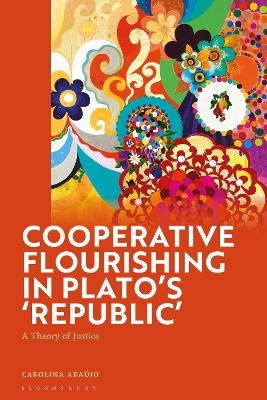
Cooperative Flourishing in Plato’s 'Republic'
A Theory of Justice
Seiten
2024
Bloomsbury Academic (Verlag)
978-1-350-25707-8 (ISBN)
Bloomsbury Academic (Verlag)
978-1-350-25707-8 (ISBN)
In this pathbreaking interpretation of Plato’s foundational text of political philosophy, Carolina Araújo reveals how the Republic remains ripe for an interpretation grounded in notions of cooperation, flourishing and justice relevant to the diversity of contemporary life.
Plato’s Republic has the Greek name of Politeia that Araújo translates as “the way of life of the citizens,” not “the State” or “the form of government” as it more traditionally rendered. Plato’s treatise, Politeia, depicts the rich array of patterns emerging from human interaction and enquires into the best amongst them. Cooperative Flourishing in Plato’s Republic returns to these important questions about society – how to live with a vast diversity of personalities, with different interests and abilities, all of them trying to flourish – and asks how best can we share our environment? With rigorous philosophical analysis of the Greek text, accompanied by original translations of the most important passages, Araújo upends mainstream scholarship to progress Socrates’ “bottom-up” view of politics and rejects previous readings of the Republic as a proto-totalitarian text, psychological study or lengthy analogy.
By defending a theory of Platonic justice that is rooted in cooperative flourishing, the public education of all citizens and the contribution of philosophers to political life, “the beautiful city”, which Plato called Kallipolis, emerges as a hopeful possibility.
Plato’s Republic has the Greek name of Politeia that Araújo translates as “the way of life of the citizens,” not “the State” or “the form of government” as it more traditionally rendered. Plato’s treatise, Politeia, depicts the rich array of patterns emerging from human interaction and enquires into the best amongst them. Cooperative Flourishing in Plato’s Republic returns to these important questions about society – how to live with a vast diversity of personalities, with different interests and abilities, all of them trying to flourish – and asks how best can we share our environment? With rigorous philosophical analysis of the Greek text, accompanied by original translations of the most important passages, Araújo upends mainstream scholarship to progress Socrates’ “bottom-up” view of politics and rejects previous readings of the Republic as a proto-totalitarian text, psychological study or lengthy analogy.
By defending a theory of Platonic justice that is rooted in cooperative flourishing, the public education of all citizens and the contribution of philosophers to political life, “the beautiful city”, which Plato called Kallipolis, emerges as a hopeful possibility.
Carolina Araújo is Professor of Philosophy at the Federal University of Rio de Janeiro, Brazil.
Introduction
Part I: Interaction
1. Desire and Reason
2. Thumos
3. Unreasonable Belief
4. Cognition
5. Power
6. Personality
Part II: Politeia
7. Thrasymachus
8. Socrates against Thrasymachus
9. Evil
10. Reasons for a City
11. Justice
Part III: Citizens
12. Popular Virtue
13. Community
14. The Good
15. Philosopher-King
16. Kallipolis
17. Flourishing
Conclusion
References
Index
| Erscheinungsdatum | 13.06.2024 |
|---|---|
| Verlagsort | London |
| Sprache | englisch |
| Maße | 169 x 244 mm |
| Themenwelt | Geisteswissenschaften ► Philosophie ► Ethik |
| Geisteswissenschaften ► Philosophie ► Philosophie Altertum / Antike | |
| ISBN-10 | 1-350-25707-9 / 1350257079 |
| ISBN-13 | 978-1-350-25707-8 / 9781350257078 |
| Zustand | Neuware |
| Haben Sie eine Frage zum Produkt? |
Mehr entdecken
aus dem Bereich
aus dem Bereich
unsere kollektive Verantwortung
Buch | Hardcover (2023)
wbg Theiss in Wissenschaftliche Buchgesellschaft (WBG) (Verlag)
35,00 €


